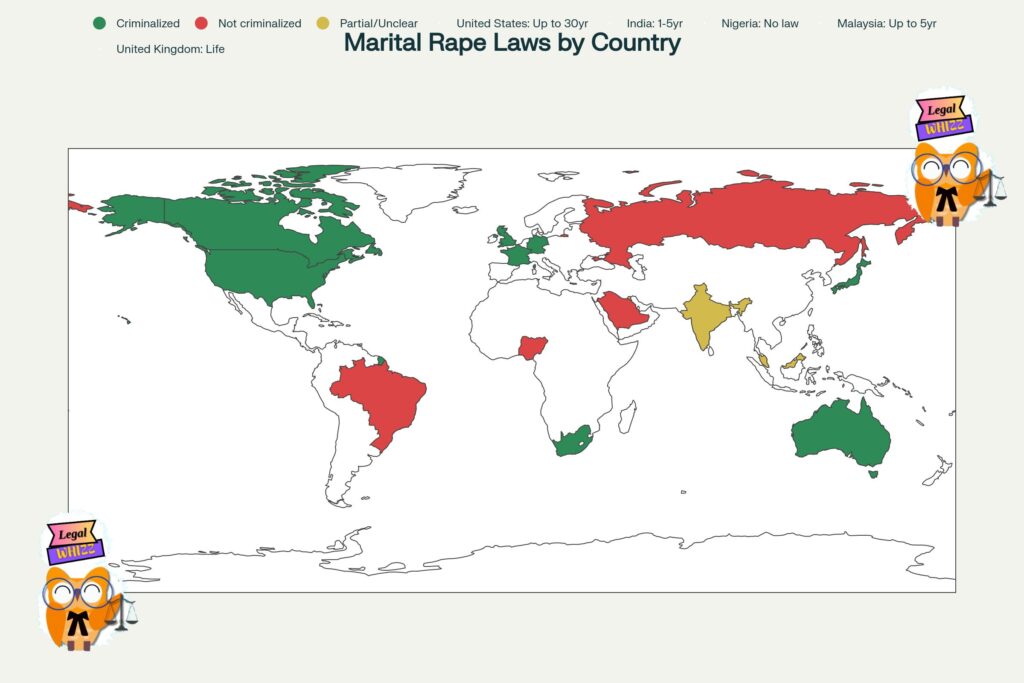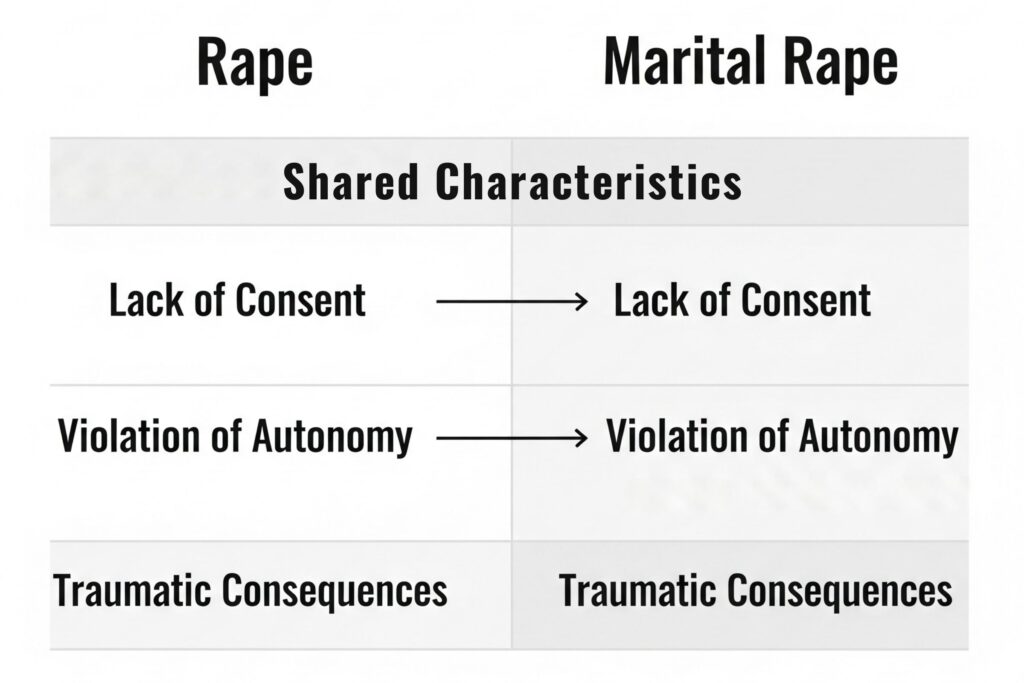In India, a woman’s home should be her safest space. Yet, for millions, it’s a place where they are most vulnerable to sexual violence. The National Family Health Survey (NFHS-5)[1] revealed a shocking truth: among married women who have experienced sexual violence, 83% reported their current husband as the perpetrator. Despite this grim reality, Indian law continues to treat this violence as an exception, not a crime.
This article examines India’s legal loophole, analyzes why the country is reluctant to criminalize marital rape, and argues for a change that would bring India in line with global human rights standards.
Author
Vedika Paliwal is a 5th-semester BBA LL.B. student at Auro University with a strong interest in corporate law.
Edited by: Vikramaditya Buddhist
Understanding Marital Rape in India
The Indian Penal Code (IPC) defines rape in Section 375. However, 375(2) creates a legal shield for husbands. It states that any sexual intercourse by a man with his wife, who is not under 18 years of age, is not considered rape.
This exception is rooted in an outdated idea: that by entering a marriage, a woman gives her perpetual consent to sexual relations with her husband. This clause effectively strips a married woman of her bodily autonomy, her right to dignity, and her freedom of choice—fundamental rights guaranteed to every citizen.
While the IPC fails to recognize marital rape as a criminal offense, there are some civil remedies. The Protection of Women from Domestic Violence Act (PWDVA) of 2005 includes sexual violence as a form of domestic violence, and a wife can seek a divorce on the grounds of “cruelty.” However, these civil laws do not carry the same legal weight as a criminal statute, and they do not adequately address the severity of the crime itself.
Criminalization of Marital Rape: What Global Laws Tell Us

While India lags, a growing number of countries have taken a strong stance against marital rape. Starting in the late 20th century, nations worldwide began amending their laws to eliminate this dangerous exception.
- United States: Marital rape was criminalized in all 50 states by 1993, though laws vary by state.
- United Kingdom: In a landmark 1991 ruling, the House of Lords declared that a husband could be convicted of raping his wife.
- South Africa: Marital rape has been a criminal offense since 1993, with strong legal penalties.
- Canada: The law has long considered marital rape to be a crime, with no distinction between a wife and any other individual.
Many of these nations also impose significant punishments for the crime, sending a clear message that a marriage license is not a license to assault. For example, in Austria, the maximum penalty is 15 years in prison, while in Finland, the maximum is four years. Jordan imposes a minimum of ten years in solitary confinement, and Israel considers it a felony punishable by up to 20 years in prison.
The United Nations has consistently urged all nations to close these legal loopholes, recognizing that the home is often one of the most dangerous places for women.[2] If so, many countries have successfully criminalized this act, what’s holding India back?
Why Is India Reluctant to Criminalize Marital Rape?
The Justice Verma Committee, tasked with reviewing India’s rape laws in 2013, recommended that marital rape be made a crime. However, the suggestion was rejected based on three primary, and highly questionable, arguments:
- Threat to the Institution of Marriage: It was argued that criminalizing marital rape could lead to misuse and threaten the stability of the institution of marriage.
- Implied Consent: The belief persists that a woman implicitly consents to sexual relations with her husband upon marriage.
- Burden of Proof: It was argued that it would be difficult to prove such a crime in court.
This reasoning is deeply flawed. The difficulty of proving a case has never been a valid reason to refuse to criminalize an act. We don’t say that crimes like murder or theft shouldn’t be illegal just because they’re hard to prove. A rapist remains a rapist, regardless of their relationship to the victim. This is a matter of fundamental human rights.
Rape and Marital Rape: A Comparative Analysis

Despite the legal distinction, the two acts are identical in their core elements and impact on the victim. Both involve:
- Lack of Consent: The sexual act is committed without the victim’s explicit agreement.
- Violation of Autonomy: Both acts are a fundamental violation of a person’s right to control their own body.
- Traumatic Consequences: Victims experience similar physical and psychological harm, including emotional distress, PTSD, and a deep sense of violation.
Criminalizing marital rape is not just about changing a law; it’s about acknowledging that a married woman has the same right to bodily autonomy and dignity as any other person. It is a crucial step towards ending sexual assault in all its forms.
Urgent Need for Legislative Change in India
The time for change is long overdue. Parliament must act to protect women from sexual violence within marriage and prevent marital rape in India. The following steps are essential:
- Amend the IPC: The exception for marital rape in Section 375 must be removed immediately.
- Equal Punishment: Marital rape should carry the same legal sentence as any other form of rape, with no distinction based on the relationship between the perpetrator and the survivor.
- Support for Survivors: The legal system must be equipped to handle these cases with sensitivity, and survivors should be able to seek a divorce on the grounds of marital rape conviction.
CONCLUSION
Marital rape is a serious and pervasive social harm that India can no longer ignore. By upholding an outdated and unjust law, the state fails to protect its women. Recognizing and criminalizing marital rape is a matter of justice, equity, and human rights. It is a necessary and vital step toward creating a safer, more just society for all.
Liked this? Read the about the latest amendments in Arbitration and Conciliation Act here.
[1] Times of India. (2022, May 11). Nearly 1 in 3 women have suffered spousal sexual, physical violence: Family health survey. The Times of India. https://timesofindia.indiatimes.com/india/nearly-1-in-3-women-have-suffered-spousal-sexual-physical-violence-family-health-survey/articleshow/91491367.cms.
[2]. Deepanshi Dwivedi, ‘Marital Rape in India’ (iPleaders Blog, 23 October 2019) https://blog.ipleaders.in/marital-rape-in-india/, accessed 12 August 2025.
